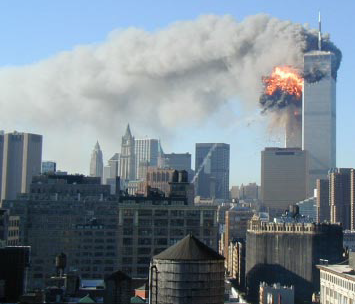
- Details
- By Levi Rickert
Opinion. When the first jetliner crashed into the North Tower of the World Trade Center at 8:46 a.m. on September 11, 2001, many believed it was a tragic accident. That perception changed just 18 minutes later when a second plane struck the South Tower—broadcast live across the nation. It quickly became clear: America was under attack.
Editor's Note: This opinion was first published by Native News Online on September 11, 2021.
As the day unfolded, horror deepened. A third plane slammed into the Pentagon, and the heroic actions of passengers aboard United Airlines Flight 93 prevented further catastrophe by forcing the plane down in a Pennsylvania field. It was a day that shocked the world—and one that reaffirmed, for many Native Americans, the duality of our citizenship.
On 9/11, tribal leaders from across Indian Country were in and around Washington, D.C., attending key policy meetings. They were there not just as representatives of sovereign nations, but also as U.S. citizens. A statement from Speaker of the Navajo Nation Council Edward T. Begay, ran a statement in the Navajo-Hopi Observer on the same day, confirmed the safety of President Kelsey A. Begaye and the Navajo delegation, while plans were made to bring them home as soon as air travel resumed.
Indian Country’s connection to the World Trade Center predates the attacks. Hundreds of Mohawk ironworkers helped build the Twin Towers in the late 1960s and ’70s. After their collapse, Mohawk descendants returned to help with the cleanup at Ground Zero—a story documented in an exhibition at the National September 11 Memorial & Museum in New York.
In the wake of 9/11, Native Americans once again stepped up. Enlistment rates in the U.S. military among Native people surpassed those of non-Natives. Osage photojournalist Steven Clevenger spent three years documenting Native soldiers during the Iraq War, culminating in his book America’s First Warriors: Native Americans and Iraq. His work explores the enduring warrior tradition in Native culture—defined since pre-Columbian times as “the protector of his people.”
Nearly 3,000 lives were lost on 9/11. But the tragedy didn’t end there. A recent report from the Watson Institute at Brown University estimates that over 929,000 people have died in the wars that followed, at a cost of more than $8 trillion to American taxpayers.
As we marked the 20th anniversary of 9/11, it’s worth noting that nearly one-third of Americans alive today weren’t even born when the attacks happened. For those of us who lived through that day, we witnessed the vulnerability of our homeland—and the unity that emerged from the rubble.
But twenty years later, we face new threats from within. The January 6th insurrection and the polarization around the COVID-19 pandemic reveal the fragility of our democracy and the importance of collective responsibility.
In the aftermath of 9/11, we stood together—across political, cultural, and racial lines. As we remember one of the darkest days in our nation’s history, we must draw on that same spirit of unity to face today’s challenges and continue working toward a safer, more secure future for all.
More Stories Like This
The Absence of October's Job Report Shows Why Native American Communities Need Better DataTribal IDs Are Federally Recognized. ICE Agents Are Ignoring Them.
Thanksgiving: Part of "Broken Circle Holiday"
Thanksgiving is a Tradition. It's Also a Lie
Decisions About Us, Without Us: Education Dismantling Ignores Tribal Nations
Help us defend tribal sovereignty.
At Native News Online, our mission is rooted in telling the stories that strengthen sovereignty and uplift Indigenous voices — not just at year’s end, but every single day.
Because of your generosity last year, we were able to keep our reporters on the ground in tribal communities, at national gatherings and in the halls of Congress — covering the issues that matter most to Indian Country: sovereignty, culture, education, health and economic opportunity.
That support sustained us through a tough year in 2025. Now, as we look to the year ahead, we need your help right now to ensure warrior journalism remains strong — reporting that defends tribal sovereignty, amplifies Native truth, and holds power accountable.
 The stakes couldn't be higher. Your support keeps Native voices heard, Native stories told and Native sovereignty defended.
The stakes couldn't be higher. Your support keeps Native voices heard, Native stories told and Native sovereignty defended.
Stand with Warrior Journalism today.
Levi Rickert (Potawatomi), Editor & Publisher


